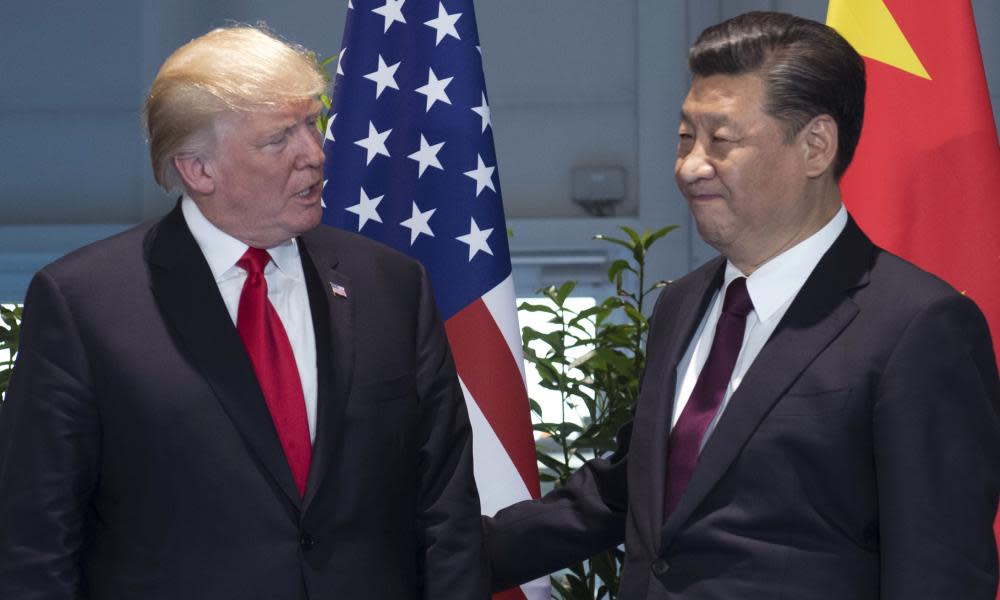Chinese state media revel in Donald Trump's Charlottesville woes

Donald Trump swept to power vowing to make America not only great again but also strong, wealthy, proud and safe.
Pick up a Chinese newspaper this week, though, and you will find the state of Trump’s nation being described in rather less triumphalist terms.
Since the deadly terrorist attack on anti-fascist protesters in Charlottesville, coverage of the US in China’s Communist party-controlled press has been peppered with four words: turmoil, chaos, mayhem and conflict.
“Hate and terror are on the rise in America, and such problems are expected to increase,” the English-language website of the People’s Daily said on Thursday, declaring the US “awash in terrible human rights abuses”.
The Chinese-language edition of the Global Times, a state-run tabloid, went further with a headline, later softened by editors, that claimed: “The US is heading towards a ‘new civil war’”.
Hu Xijin, the newspaper’s editor, used an online opinion video to express incredulity at the mess the US was in.
Worsening of the US system's flaws make the current chaotic state of US values even more dangerous: Editor-in-Chief Hu Xijin #HuSays pic.twitter.com/RjVnYGnPD6
— Global Times (@globaltimesnews) August 17, 2017
“From China’s perspective the current divisions in the US are shocking,” Hu said. “It is a mystery how the US can deal with this conflict while operating normally at the same time.”
Xinhua, China’s official news agency, warned that after the “death and violence” visited on Charlottesville, the US “should take a minute to reflect on its own human rights situation before pointing accusing fingers at China”.
“Despite its self-proclaimed role as the world’s human rights champion, the fact is the world’s sole superpower is far from becoming a respected role model in this regard,” it said.
For decades Beijing propagandists have sought to bolster the Chinese Communist party’s international legitimacy and reinforce its grip on power by painting western democracies, particularly the US, as cauldrons of disorder, corruption, racial tension and social discord.
Bill Bishop, the Washington-based publisher of the China-focused newsletter Sinocism, said the party’s message to its democracy-starved subjects was: “Stop having all these fantasies about how terrible we are and how much better the west is: look at all the problems the west has.’”
In the tumultuous months since Trump took office Chinese spin doctors have found their inboxes overflowing with material.
“The themes [being used to attack America] haven’t changed in decades ... But [under Trump] the propaganda is in many ways converging more with the facts,” Bishop said. “Their jobs are much easier now: in many ways the propaganda writes itself and it’s not really propaganda anymore ... They can just report the facts, slap a headline on it and the story tells itself.”
Anne-Marie Brady, an expert in Chinese politics at the University of Canterbury in Christchurch, New Zealand, said she had been struck by the radically different treatments Beijing’s English and Chinese-language outlets were giving to Charlottesville, something she said would have been coordinated at the very highest editorial levels.
Domestic media reports had been largely factual and somber in tone, with little explanation of the attack’s context, Brady said. “The message to the domestic audience is: this is a terrible, terrible tragedy and we don’t want this to happen here.”
Beijing’s message to the world, on the other hand, was gloating and combative and designed to paint China as a strong and stable global leader that had avoided the political and social havoc gripping the west, she continued.
“The aggressive response, and use of this tragedy to attack the US government and political system, reflects a more assertive, and at times aggressive, Chinese foreign policy under Xi Jinping,” Brady said.
In the future, “we can expect to see more aggressive verbal attacks depicting western democracies as chaotic, versus depiction of the Chinese political model as representing stability, progress and leadership”.
That was precisely the message in the English-language edition of the Global Times on Monday: “As US struggles with chaos, China responds with stability,” one columnist wrote, adding that “the world’s superpower is increasingly mired in chaos”.
In conclusion, the author said: “Beijing should be confident of and stick to its own path for development and stability.”
A similar line also emerged from China’s foreign ministry this week. Asked to comment on a US state department report condemning China for curtailing religious freedoms, spokeswoman Hua Chunying said: “Facts have proved that the US is far from perfect.”
Bishop said: “Trump is in many ways a caricature of the evil capitalist American president ... and that gives the Communist party much more ammunition to craft much more compelling and convincing propaganda. The implication is: ‘Look, we’re not so bad.’”
Additional reporting by Wang Zhen

 Yahoo News
Yahoo News 